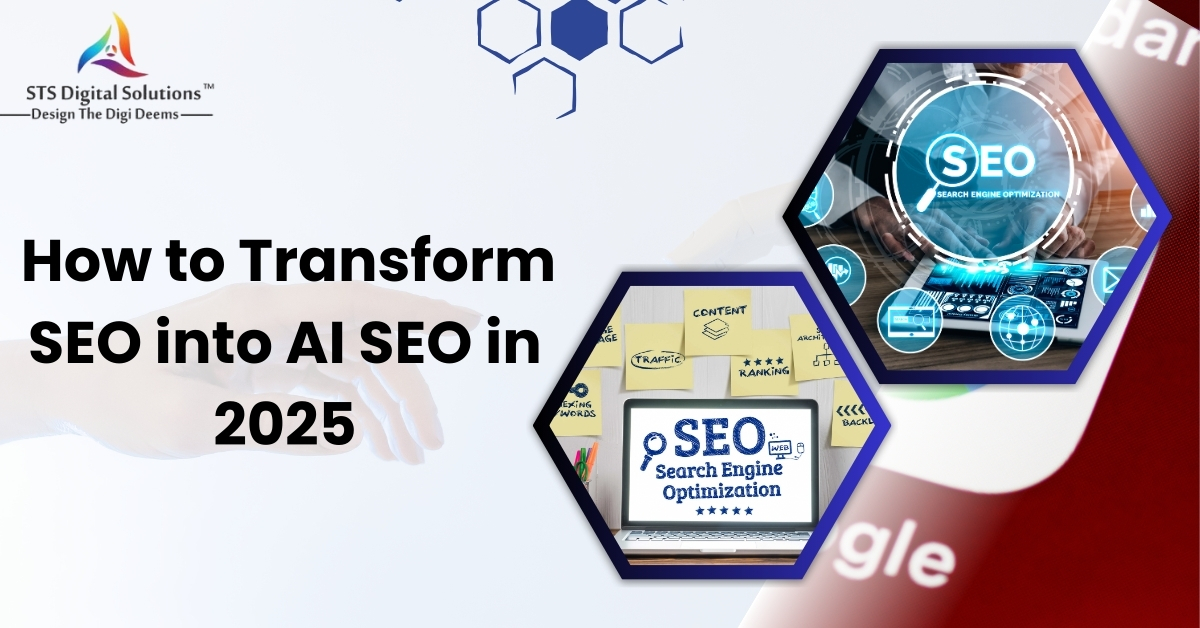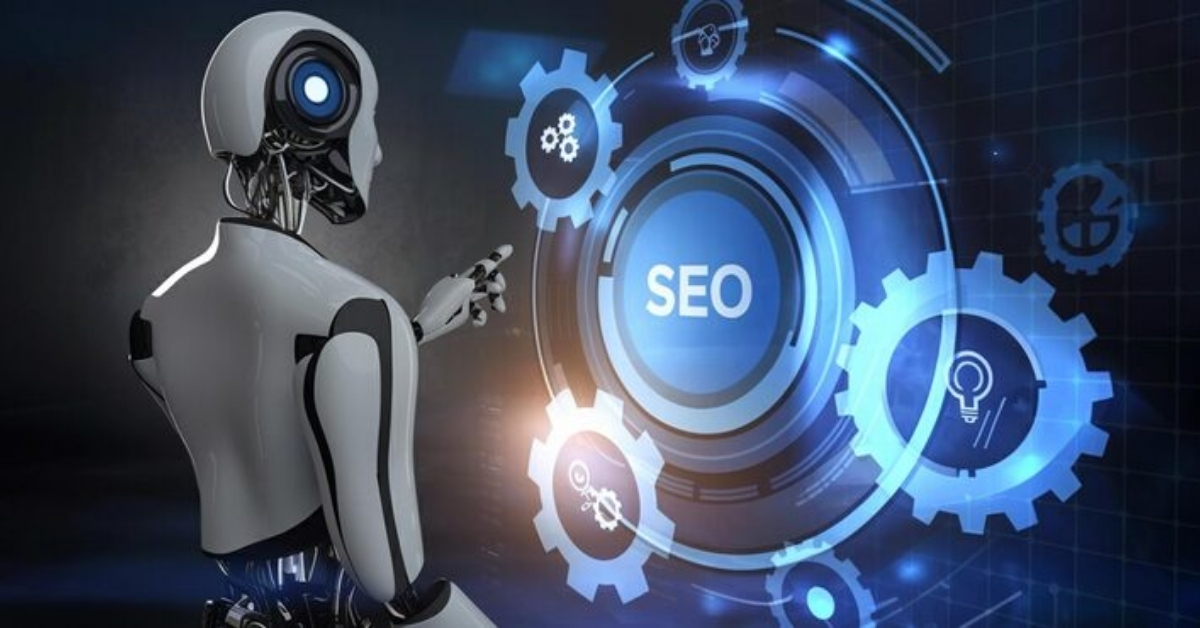How to Transform SEO into AI SEO in 2025

Understanding the Shift from SEO to AI SEO
Search engine optimization has always been about making your website discoverable by search engines like Google. However, in 2025, optimization no longer stops with Google alone. With the rise of AI-driven assistants such as ChatGPT, Gemini, and Claude, people now get answers directly from AI tools instead of browsing dozens of websites. This shift means that websites must adapt from traditional SEO practices to AI SEO, where content is optimized not only for search engines but also for AI models that deliver answers.
Why AI SEO Matters in 2025
AI SEO is about preparing your website in such a way that conversational AI tools can crawl, understand, and recommend your content as part of their answers. If your website is not optimized for AI, it risks being invisible in the future digital landscape. Users are increasingly asking direct questions like “What are the best digital agencies near me?” and expecting tools like ChatGPT to fetch accurate results instantly. To be included in these results, your site needs AI-focused optimization.
Key Tips to Convert SEO into AI SEO
Rewrite existing pages into Q&A style — For example, instead of saying “We provide SEO services”, reframe it as “If you are looking for SEO services in 2025, here’s how they can benefit your business”. This makes your content AI-friendly.
- Add FAQ schema
- Use conversational keywords
- Refresh old blogs regularly
- Leverage internal linking smartly
- Create answer-based headings
- Add author credibility
AI tools love structured data. Adding FAQ schema helps your site get pulled directly into AI-generated answers.
Instead of only targeting “best SEO agency Delhi,” start optimizing for natural phrases like “Which is the best SEO agency in Delhi for startups?”
AI models prefer updated information. Even a small refresh (adding 2025 data, new stats, or recent examples) increases your chances of being picked up.
Linking related blogs together shows AI that your site covers a topic deeply (building topical authority).
Instead of “AI SEO Benefits,” write “What Are the Benefits of AI SEO in 2025?” This mirrors how people ask ChatGPT questions.
A named author with expertise signals trust to AI crawlers, which use E-E-A-T (Experience, Expertise, Authoritativeness, Trustworthiness).
How AI Reads and Crawls Websites Differently
Traditional SEO focuses on keywords, backlinks, and structured data for Google’s bots. AI models, however, focus on context, relevance, and authority of content. They don’t just look for exact keywords; they evaluate whether your website’s content answers questions naturally. AI also relies heavily on structured data, schema markup, and conversational tone to decide whether to feature your page in a response.
This means that instead of just repeating best SEO agency multiple times, AI wants to see comprehensive, context-rich content that explains what makes an SEO agency effective, why it matters for businesses, and how someone can evaluate it.

Step 1: Restructure Your Content for Conversational Queries
To transform traditional SEO into AI SEO, start by rewriting your website content in a question-and-answer format. AI tools are designed to respond to natural language questions, so your website must contain clear, conversational explanations. For example, instead of writing:
Digital marketing agencies provide SEO, social media, and paid advertising services.You should reframe it as:
If you are wondering what a digital marketing agency does, it usually offers services like SEO, social media marketing, and paid ads that help businesses grow online.
By writing in this conversational style, you make it easier for AI systems to pick your content as a direct response.
Step 2: Add Structured Data and Schema Markup
AI tools rely heavily on structured data to identify who you are, what you do, and why your content is relevant. Using schema markup for FAQs, local business details, products, and reviews helps AI assistants understand your content better. For example, if someone asks ChatGPT,
Which is the best restaurant near me? the AI will prefer showing a restaurant that has LocalBusiness schema properly implemented.
Adding structured data to your website ensures that both Google and AI tools can confidently recommend your content.
Step 3: Focus on Semantic SEO and Topic Clusters
In AI SEO, exact keyword matching matters less than semantic depth. AI models analyze your website to see if it covers a topic comprehensively. Instead of targeting one keyword like “SEO in 2025,” you should create a topic cluster covering:
- What is AI SEO?
- How AI SEO differs from traditional SEO
- Tools for AI SEO
- Benefits of AI SEO for businesses
- Future of SEO with AI
When AI sees that your website has a network of related articles, it will consider you an authority on the subject, which increases the chances of being recommended in AI-powered responses.
Step 4: Optimize for AI Crawlers Like ChatGPT
Unlike Google crawlers that mainly scan web pages for indexing, AI models like ChatGPT or Gemini learn from contextual, reliable, and updated data. To make your website AI-friendly:
- Keep your content updated frequently, as AI favors fresh, relevant information.
- Use FAQs on every service or product page since AI often extracts answers from FAQ-style content.
- Maintain clarity in explanations, avoiding jargon unless necessary, because AI ranks easy-to-understand answers higher.
Step 5: Build Trust and Authority for AI Selection
AI SEO is not just about keywords; it’s about trust. AI tools prefer websites that demonstrate expertise, authority, and trustworthiness (E-A-T). This means:
- Publishing content written by real experts in the field.
- Adding author bios, credentials, and case studies.
- Getting cited or linked to from other credible sources.
When AI algorithms detect that your brand has authority, they are more likely to reference your site in user responses.
Step 6: Create Content That Solves Problems in Depth
AI thrives on problem-solving content. If a user asks, “How can I improve my website SEO in 2025?” and your page has a detailed explanation with step-by-step advice, AI will consider it more useful than a shallow article.
To move from SEO to AI SEO, always think: If ChatGPT were answering a question, would my page be the perfect fit to be quoted? If the answer is no, your content needs more depth.
Step 7: Voice Search and Conversational AI Integration
In 2025, a large part of queries comes through voice assistants and conversational AI. This means your website must be optimized for long-tail, conversational queries like “Which digital marketing agency near me can help with AI SEO?” rather than just “digital marketing agency.”
By weaving natural questions into your content, you increase your chances of being included in AI-driven voice results.

Step 8: Monitor AI SEO Performance
Just like traditional SEO had analytics, AI SEO requires monitoring how AI platforms are picking up your content. While there isn’t a single tool yet that shows “AI rankings,” you can track performance by:
- Checking which AI tools are referencing your content.
- Monitoring traffic shifts from traditional search to referrals from AI-powered browsers or assistants.
- Testing queries on ChatGPT, Gemini, and other platforms to see if your content appears.
This helps refine your strategy continuously.
The Future of SEO Is AI SEO
By 2025, the line between traditional SEO and AI SEO will blur. Businesses that adapt early will have a clear advantage, as they will not only be discoverable on Google but also be featured directly in AI-driven responses. This requires shifting from keyword-stuffed articles to conversational, structured, and authority-driven content strategies.
Conclusion
Transforming SEO into AI SEO in 2025 is not about abandoning what worked in the past but about adapting those practices for AI-powered environments. By restructuring your content for conversational queries, implementing schema markup, focusing on semantic coverage, and building trust, you can ensure that your website is visible not only on Google but also on AI platforms like ChatGPT and Gemini. Businesses that take this step early will dominate the future of search visibility.
For brands looking to make this shift seamlessly, STS Digital Solutions offers advanced strategies to help websites evolve from traditional SEO to AI SEO, ensuring that your business stays ahead in the rapidly changing digital landscape.
Sahil Goyal
Founder & CEO – STS Digital Solutions
Sahil Goyal is an experienced digital marketing strategist and growth leader, who has assisted some of the most successful BFSI & Healthcare, Automotive, and E-Commerce brands to attain sustainable and quantifiable digital success. Being the Founder & CEO of STS Digital Solutions, he spearheads performance-oriented actions in SEO, Digital Marketing, Social Media Marketing, Performance Marketing, E-Commerce Marketing, which assist business to create substantial online presence and generate continuous growth in revenues.
He is a pragmatic and data-driven consultant that focuses on the development of the scalable digital strategies wherein technical SEO, high-quality content, paid advertising, and performance marketing are merged. He is of the opinion that marketing should be aligned with the obvious business objectives, such as more organic traffic, stronger social media brand awareness, paid campaigns that are more ROI-friendly, or more e-commerce brands conversions.



